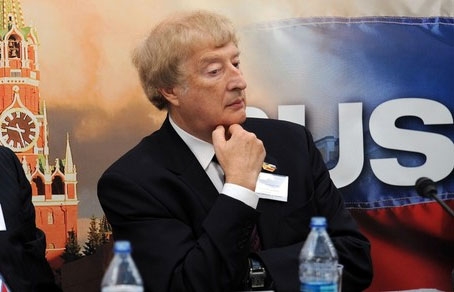
Edward Lozansky
Edward Lozansky is president of the American University in Moscow, Professor of Moscow Sate and National Research Nuclear Universities
 The U.S. had two options after the Soviet collapse: to integrate Russia into Western security and economic structures or to further isolate and weaken it by expanding NATO to its borders and integrating other former Soviet republics instead.
The U.S. had two options after the Soviet collapse: to integrate Russia into Western security and economic structures or to further isolate and weaken it by expanding NATO to its borders and integrating other former Soviet republics instead.
U.S. President George H.W. Bush leaned toward integrating Russia into the West, but he lost his re-election bid in 1992. His successors — Bill Clinton, George W. Bush and to a somewhat lesser degree Barack Obama — have chosen to isolate and weaken Russia by moving closer to countries like Georgia and Ukraine.
Russia's Crimean policy is the logical reaction of a strong Russia that can counter the U.S.
What we are seeing now in Crimea is the logical reaction of a restored and re-energized Russia that is determined to counter the obviously failed U.S. policy.
Therefore, anyone who resents Crimea joining — or rather returning to — Russia, please stop your angry muttering. The deed has been done, and the only chance of its reversal is to declare war on Russia. War, however, would mean committing nuclear suicide, leading to the death of human civilization.
Thankfully, nobody has shown a willingness to go that far, not even the most outspoken U.S. politicians like Senator John McCain and his followers, whom one-time presidential candidate Patrick Buchanan aptly branded "the McCainiacs."
I suppose we ought to feel grateful for this sign of sobriety. But the U.S. and European Union have imposed sanctions against Russia and could unveil even tougher economic penalties in the coming days or weeks.
Nobody doubts that the West could inflict significant damage on Russia. But sanctions cannot be one-sided as was the case in, say, Iran. Global economies are too integrated. Russia's economy ranks among the Top 10 in the world, and scores of Western companies, including U.S. giants, do good business in Russia. Sweeping sanctions also cannot be imposed without a united front from Washington and Brussels, and it is unlikely that the two political capitals will be able to find common ground on all issues.
Washington should stop accusing Moscow of violating international law in Crimea because it is guilty of committing the same crime time and again. Curiously, the Iraq war was wholeheartedly endorsed by the same people who are now ranting about Crimea, the McCainiacs, former U.S. Secretary of State Condoleezza Rice and, oddly enough, Secretary of State John Kerry. In his youth, Kerry spoke out against the Vietnam War and used his opposition to the war as a springboard for a successful political career.
Who has benefited from the Iraq war? Ask the thousands of Iraqis and Americans who have lost loved ones in the fighting. Or ask the U.S. taxpayers who have spent some $2 trillion on the effort, even as the U.S. national debt nears $18 trillion, or 130 percent of gross domestic product.
Incidentally, none of the countries that opposed the U.S.-led invasion of Iraq, including Russia, France and Germany, called for sanctions against the U.S. or its allies. But U.S. lawmakers and the media, infuriated with France's opposition to the war, tried to turn the tables and institute their own sanctions, such as the boycott of French cheese and wine and called for french fries to be renamed "freedom fries."
What is to be done now with Crimea?
Just like after the Soviet collapse, Washington is left with two options on how to deal with Russia.
The short-term policy would see the U.S. pressure Ukraine's interim government to stop spouting belligerent bluster about increasing the country's military budget at a time when it is on the verge of bankruptcy. Kiev must instead start rescuing the country's economy and integrity by moving toward a confederation model in which Ukraine's southeast and eastern areas would enjoy extensive autonomy. In the process, the U.S., the EU, the International Monetary Fund and Russia would need to urgently negotiate a financial bailout package that envisaged the least painful social reforms possible for the people of Ukraine.
The long-term policy, based on the "better late than never" adage, would hark back to the senior Bush-era option of building a new global security architecture from Vancouver to Vladivostok. The architecture should be expanded further to include Tokyo, Beijing, Shanghai and Seoul in the light of the current alignment of forces that differ from the 1991 configuration.
Russian leaders, judging from their numerous statements, would be ready for such talks.
Washington's current foreign policymakers are not likely to embrace either option. But elected officials ought to take into account recent public opinion polls. The approval rating of U.S. Congress has plummeted to 8 percent, while Obama's foreign policy has the support of just 33 percent. An overwhelming majority of the U.S. public is dissatisfied with their political leadership. Moreover, only half of U.S. citizens back sanctions against Russia despite colossal pressure from the media, Congress and Obama himself for tough action.
The opinion polls offer reason for optimism because the U.S. has high standards of democracy. Sooner or later the authorities must listen to the public.
Hard times wait ahead for Ukraine. Its people will have to tighten their belts and cut back on basic needs and desires.
But hard political times are also in store for everyone. The leaders of the U.S., the EU and Russia face the challenge of preventing the current crisis from escalating to the point where the vehement rhetoric of some shortsighted politicians results in tragic and unpredictable consequences.



.jpg/250px-ElbeDay1945_(NARA_ww2-121).jpg)





